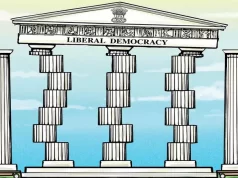Spontaneous order is defined as those social structures that emerge organically and spontaneously over a long period of time from individual uncoordinated actions of a large number of people without any central guidance. It is a key concept in the libertarian line of thought.
The idea of spontaneous order originated with Michael Polanyi’s essay “The Growth of Thought in Society,” wherein he is credited with coining the term ‘spontaneous order’. The proponents of the Austrian School of Economics, led by Carl Menger, Ludwig von Mises, and Friedrich Hayek, also popularised the idea in their social and economic theories. Further, Adam Smith developed the concept of spontaneous order extensively in both ‘The Theory of Moral Sentiments’ (1759) and ‘An Inquiry into the Nature and Causes of the Wealth of Nations’ (1776). Numerous social structures, such as trade, language, money, and the moral code, are regarded as instances of spontaneous order.
When first introduced to the idea of spontaneous order, one may wonder whether it is possible for people to cooperate as voluntary agents to accomplish goals that both perfectly align with the social order and the greater good of humanity. Indeed, this is what spontaneous order is defined as. But then one might also wonder: what about the society slipping into anarchy without any state intervention?
According to the Saptanga doctrine developed by Kautilya in Arthashastra, one of the necessary components that the Swami (king) must yield to construct a prosperous kingdom is Danda (army). Furthermore, how can we get past Hobbes’ presumption that people are self-interested, though a distinction needs to be made here between selfishness and self-interests. Selfishness invariably causes another actor to suffer a negative outcome, yet a group of individuals acting in their own best interests can benefit society and produce a positive outcome. For instance, monetary or materialistic transactions—which we might characterise as an exchange that can take place between people depending on their interests and value for certain products, therefore serving their own self-interests—are a necessary component of trade. However, there is a likelihood that individuals would violate the naturally occurring coordinated order due to personal objectives that may conflict with the larger good. For example, theft and loot usually serves the interest of one party at the expense of the other party’s welfare and sometimes at the expense of the greater societal good.
The beauty of spontaneous order comes from the simple reality that people unintentionally create an order in their daily lives that supports the economy and increases societal productivity. Hayek observes that as social order is rooted in human acts rather than human planning, it emerges from the conclusion of human judgments and does not require the creation of any particular social or economic framework. For Hayek, spontaneous order emphasizes a bottom-up strategy as opposed to planned order’s top-down strategy. Additionally, he argues that economies and societies are too complicated to comprehend for a single pattern of order to apply to all situations, which considers the complexity of the presence of many diverse societies and ethnic groups.
As social orders in economies and societies evolve, so do the higher levels of the bottom-up strategy. Hayek further points out that because spontaneous order has its roots deeply ingrained in human behavior and deeds, it has the unique quality of adaptability to various situations as it is characterized by fast change and vast uncertainty, which might not be possible for intended or constructed order.
A lot of anarchists think that the core idea of anarchism is spontaneous order. They contend that in anarchy, the inherent feeling of coordination developed amongst the various actors of the society via their individual duties and labor would allow the community to function even in the absence of state authority and intervention.
Numerous critiques of spontaneous order exist, but they mostly center on the charge of irrationality. This is because conservationists, who embrace a planned order more comprehensively, view spontaneous order as somewhat unusual. Many religious and classical thinkers disagree with the idea of spontaneous order because it contradicts the view held by some that the cosmos was created by a higher power, namely God.
Also, both intended and spontaneous orders may closely relate to the situation. Hence, it simply depends on the lens of the viewer. For instance, thousands of people amicably and cooperatively move past one another as soon as you enter a mall. When examined closely, one might see that it is a naturally occurring social order—more like a code of conduct—that has been established through individual behaviors and opinions about how to act in a mall when shopping. However, if you look at it through a different lens, one may notice that there is a sense of structured formal organisation that has been put in place to maintain harmony and coordination.
India’s culture has fostered harmony, peace, and collaboration for societal improvement across generations. With its cultural origins in the Indus Valley society, this almost 9,000-year-old society has adapted to its complexity and achieved much despite it. Given the history of societies and nations, it is likely that people first developed an innate sense of survival and identity rather than a formal authority when our civilization first emerged.
Nevertheless, people could still adapt to complex structures, which led to the development of society, government, and trade, i.e., Samaaj, Sarkaar and Bazaar. For instance, when you take a rickshaw to go from one place to another, the rickshaw pullers will always ask you for a standard price, which even the passengers know and agree upon. However, this standard is not set by the government or any other official authority; rather, it is the result of discussions among the rickshaw pullers in each area, and only through these discussions are rickshaw prices set from one locality to the next. We can argue that a consensus of this kind could only arise from a shared language, geography, or even identity.
Overall, spontaneous order remains a fundamental concept in understanding the dynamics of social, economic, and even natural systems, providing valuable insights into how order can emerge from seemingly chaotic interactions.
Post Disclaimer
The opinions expressed in this essay are those of the authors. They do not purport to reflect the opinions or views of CCS.






